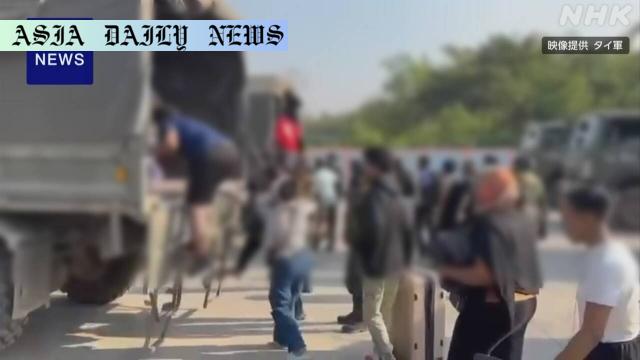Human Trafficking: Thai authorities announce plans to transfer 1,219 victims freed in Myanmar to Thailand for protective custody.

Overview of the Human Trafficking Crisis
The recent rescue of 1,219 individuals who were trapped in human trafficking schemes in Myanmar marks a critical milestone in the ongoing regional fight against trafficking activities. Thai authorities have taken responsibility for transferring these individuals, of 12 different nationalities, to Thailand to provide them with protective custody and support services. The majority of these victims include Chinese (1,041 individuals), Indonesians (71), and Vietnamese (40), with no Japanese nationals reported. This type of activity highlights the growing epidemic of forced scams and coercive operations near the Myanmar-Thailand border.
Impact of Myanmar’s Coup on Trafficking Activities
Since Myanmar’s military-led coup in 2021, criminal organizations have taken advantage of the instability to set up their operations near the Thai border. These groups often target foreign nationals, employing coercive tactics to trap individuals into participating in illegal activities such as scams. With Myanmar’s eastern district of Myawaddy becoming a hotspot for trafficking, this issue has spiraled into an international humanitarian concern.
Details of the Rescue Operations
Thai authorities have revealed that the rescue operations took place across various regions, with significant efforts focused on Myawaddy. While the identification of victims is ongoing, the international aspect of this operation is alarming, with the majority of freed individuals being Asian nationals. Thai officials emphasized their commitment to ensuring legal protection, medical support, and reintegration programs for the victims once they arrive in Thailand.
Ongoing Investigations and Future Rescue Plans
Efforts are underway to not only uncover the depth of trafficking networks but also to ensure that other victims, including Japanese nationals, are located and freed. The multi-national nature of this crime calls for increased collaboration between governments, international organizations, and law enforcement agencies to crack down on trafficking networks. Thai officials have expressed the urgency of accelerating their rescue missions while addressing the broader structural issues that perpetuate such crimes.
Regional and International Implications
This incident underscores the regional implications of trafficking and illegal scams, particularly in politically unstable countries like Myanmar. Human trafficking continues to be a global issue that requires cross-border cooperation and effective legal enforcement. Regional players such as Thailand are now positioned to lead the charge against trafficking by creating robust legal frameworks and offering refuge for survivors.
Addressing the Root Causes of Trafficking
The crackdown on trafficking is a step forward, but addressing the root causes – such as economic vulnerabilities, political instability, and lack of enforcement – remains crucial. Governments and NGOs alike must focus on preventing exploitation through education, awareness, and stricter governance in affected regions. Without addressing these core issues, trafficking networks will continue to exploit those who are most vulnerable.
Final Thoughts
The rescue of these 1,219 victims is not just a win against human trafficking but also a poignant reminder of the ongoing fight against exploitation globally. Ensuring the safety, rehabilitation, and justice for these individuals must remain a priority for concerned authorities and international groups. Collaborative efforts will play a vital role in rooting out trafficking networks and protecting the human rights of marginalized communities worldwide.
Commentary
A Call for Global Action Against Human Trafficking
The recent rescue of over 1,200 trafficking victims in Myanmar highlights the grim reality of modern slavery and exploitation. While this rescue operation is commendable, it also serves as evidence of the widespread and deep-seated issue of human trafficking in politically unstable regions. Human trafficking not only strips away the fundamental rights of individuals but also tears apart families and communities.
The Need for Collaborative Efforts
Addressing human trafficking requires the collective effort of international bodies, governments, and local communities. The multi-national nature of this issue, evident from the wide range of nationalities among the victims, necessitates strong cross-border collaboration. Countries need to share resources, intelligence, and manpower to dismantle trafficking networks effectively.
A Focus on Victim Rehabilitation
While freeing victims is a critical first step, their rehabilitation must also be prioritized. These individuals have likely endured severe emotional and psychological trauma, along with physical abuse. Comprehensive care programs, including counseling, healthcare, and reintegration efforts, are essential for helping survivors rebuild their lives. Thailand’s commitment to providing protective custody is a positive move, but extended support must follow.
Broader Implications and Preventive Measures
This incident also urges stakeholders to address the root causes of human trafficking, including socioeconomic disparities, lack of education, and weak legal frameworks. Prevention requires a multi-pronged approach involving education campaigns, stricter enforcement, and targeted aid for at-risk populations. This will reduce vulnerabilities and cut off the supply of people traffickers exploit.
In conclusion, the fight against human trafficking is a critical battle for humanity, and while victories like this rescue operation provide hope, the journey to eradication remains long. We must all contribute, whether through raising awareness, supporting anti-trafficking organizations, or urging policymakers to take meaningful action.


